Organisational Behaviour Report: Influence of Culture, Politics, Power
VerifiedAdded on 2022/12/28
|15
|4480
|44
Report
AI Summary
This report delves into the intricacies of organisational behaviour, using Tesco as a case study. It examines how organisational culture, politics, and power dynamics influence individual behaviour within the company. The report analyzes the different types of culture, including power, task, person, an...
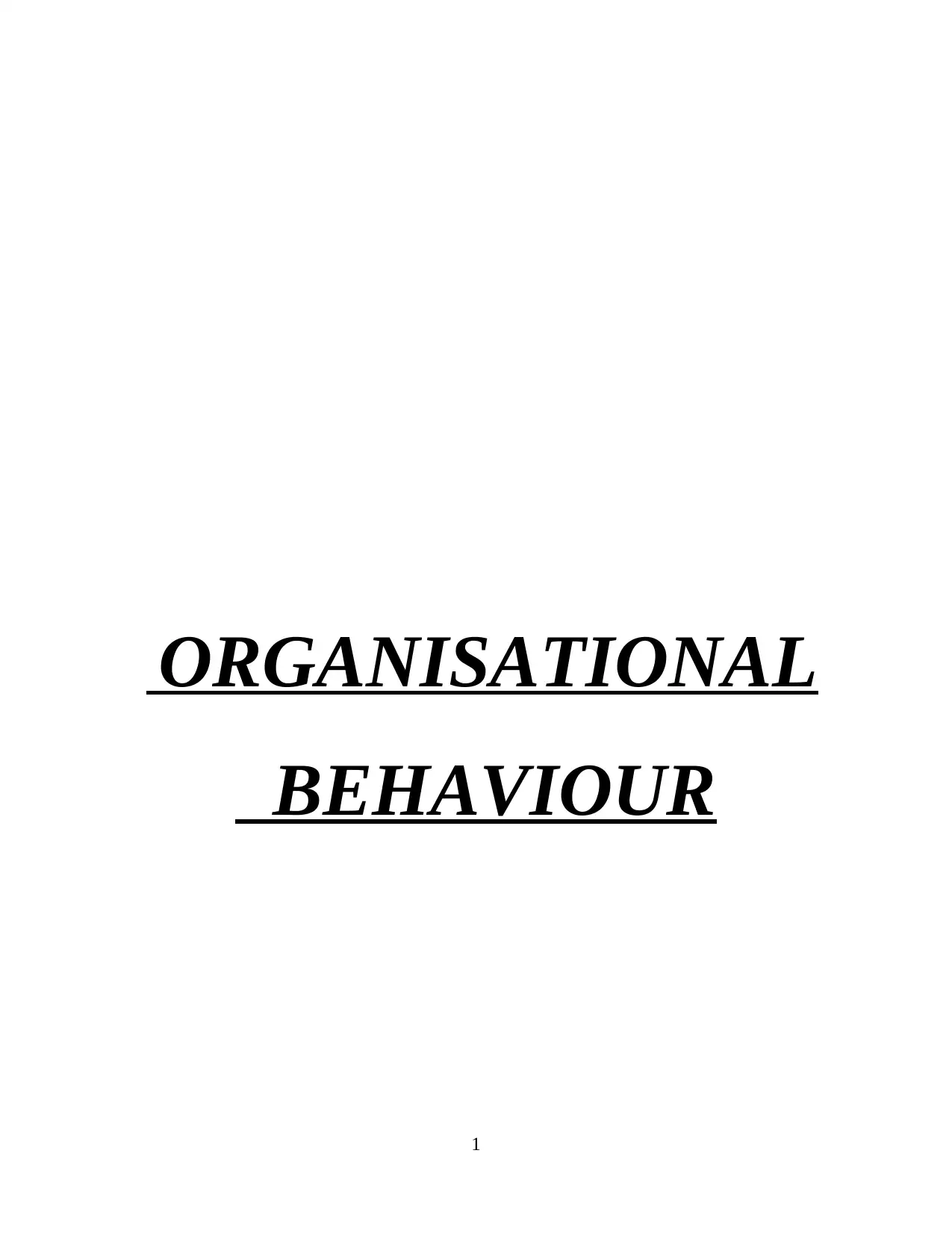
ORGANISATIONAL
BEHAVIOUR
1
BEHAVIOUR
1
Paraphrase This Document
Need a fresh take? Get an instant paraphrase of this document with our AI Paraphraser
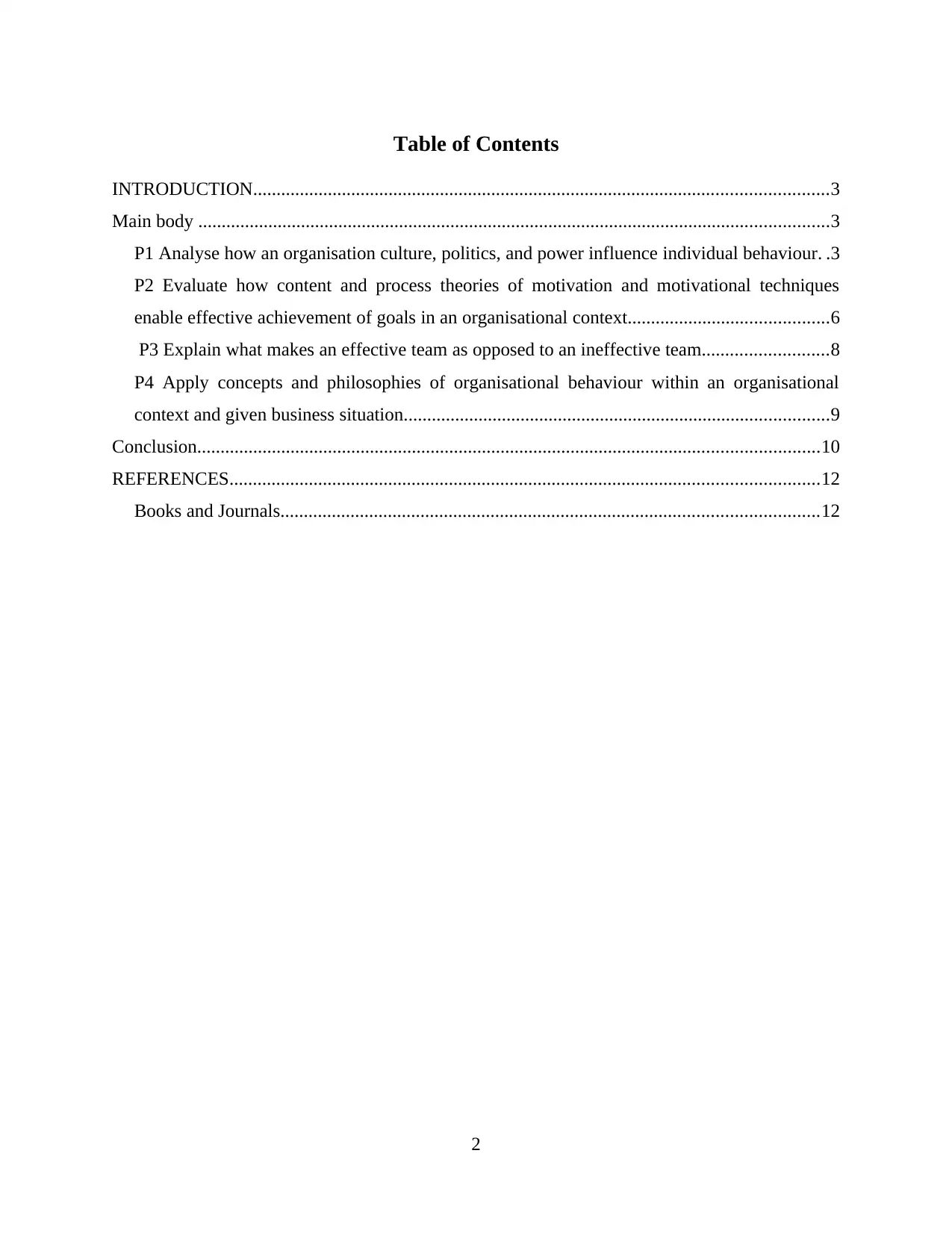
Table of Contents
INTRODUCTION...........................................................................................................................3
Main body .......................................................................................................................................3
P1 Analyse how an organisation culture, politics, and power influence individual behaviour. .3
P2 Evaluate how content and process theories of motivation and motivational techniques
enable effective achievement of goals in an organisational context...........................................6
P3 Explain what makes an effective team as opposed to an ineffective team...........................8
P4 Apply concepts and philosophies of organisational behaviour within an organisational
context and given business situation...........................................................................................9
Conclusion.....................................................................................................................................10
REFERENCES..............................................................................................................................12
Books and Journals...................................................................................................................12
2
INTRODUCTION...........................................................................................................................3
Main body .......................................................................................................................................3
P1 Analyse how an organisation culture, politics, and power influence individual behaviour. .3
P2 Evaluate how content and process theories of motivation and motivational techniques
enable effective achievement of goals in an organisational context...........................................6
P3 Explain what makes an effective team as opposed to an ineffective team...........................8
P4 Apply concepts and philosophies of organisational behaviour within an organisational
context and given business situation...........................................................................................9
Conclusion.....................................................................................................................................10
REFERENCES..............................................................................................................................12
Books and Journals...................................................................................................................12
2
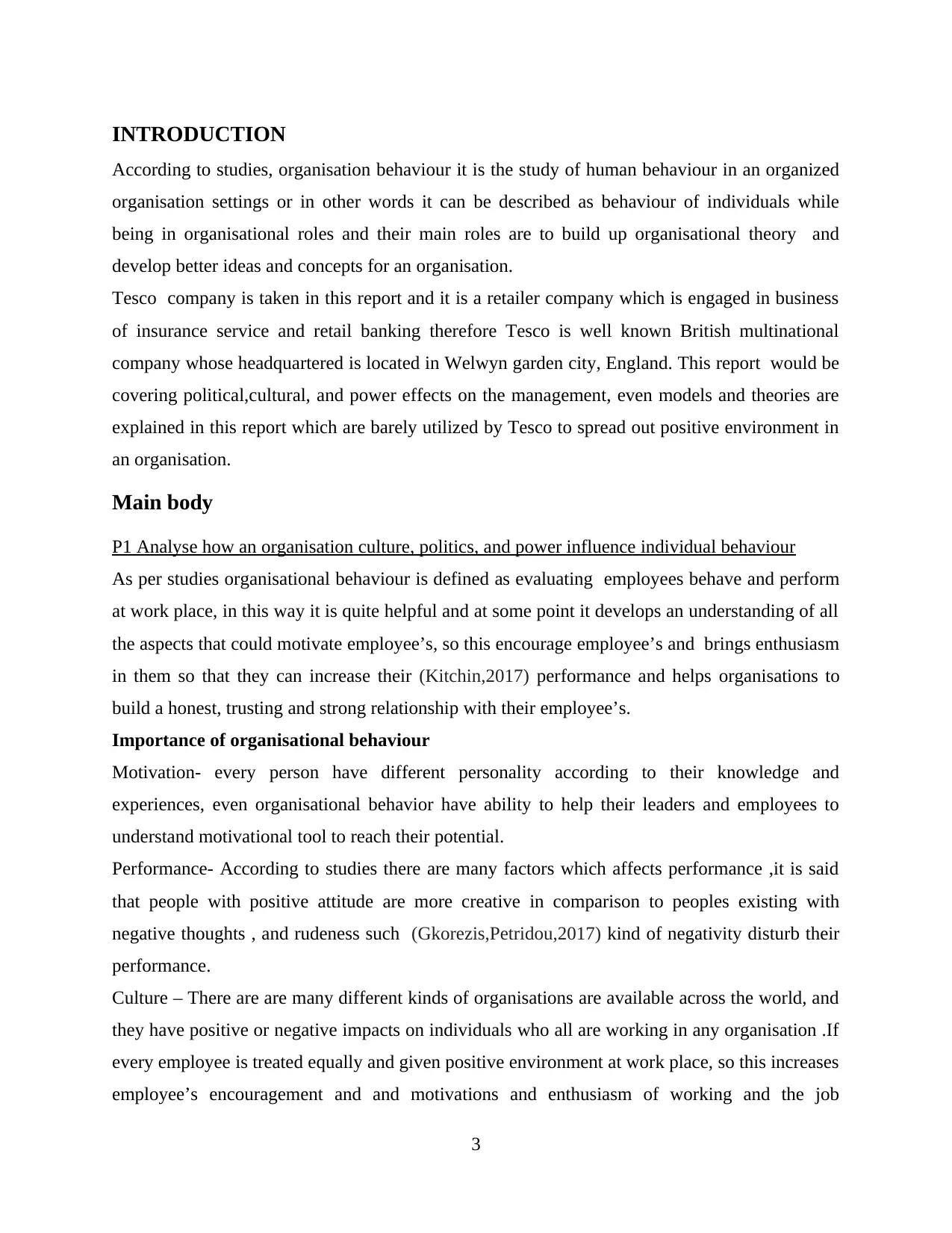
INTRODUCTION
According to studies, organisation behaviour it is the study of human behaviour in an organized
organisation settings or in other words it can be described as behaviour of individuals while
being in organisational roles and their main roles are to build up organisational theory and
develop better ideas and concepts for an organisation.
Tesco company is taken in this report and it is a retailer company which is engaged in business
of insurance service and retail banking therefore Tesco is well known British multinational
company whose headquartered is located in Welwyn garden city, England. This report would be
covering political,cultural, and power effects on the management, even models and theories are
explained in this report which are barely utilized by Tesco to spread out positive environment in
an organisation.
Main body
P1 Analyse how an organisation culture, politics, and power influence individual behaviour
As per studies organisational behaviour is defined as evaluating employees behave and perform
at work place, in this way it is quite helpful and at some point it develops an understanding of all
the aspects that could motivate employee’s, so this encourage employee’s and brings enthusiasm
in them so that they can increase their (Kitchin,2017) performance and helps organisations to
build a honest, trusting and strong relationship with their employee’s.
Importance of organisational behaviour
Motivation- every person have different personality according to their knowledge and
experiences, even organisational behavior have ability to help their leaders and employees to
understand motivational tool to reach their potential.
Performance- According to studies there are many factors which affects performance ,it is said
that people with positive attitude are more creative in comparison to peoples existing with
negative thoughts , and rudeness such (Gkorezis,Petridou,2017) kind of negativity disturb their
performance.
Culture – There are are many different kinds of organisations are available across the world, and
they have positive or negative impacts on individuals who all are working in any organisation .If
every employee is treated equally and given positive environment at work place, so this increases
employee’s encouragement and and motivations and enthusiasm of working and the job
3
According to studies, organisation behaviour it is the study of human behaviour in an organized
organisation settings or in other words it can be described as behaviour of individuals while
being in organisational roles and their main roles are to build up organisational theory and
develop better ideas and concepts for an organisation.
Tesco company is taken in this report and it is a retailer company which is engaged in business
of insurance service and retail banking therefore Tesco is well known British multinational
company whose headquartered is located in Welwyn garden city, England. This report would be
covering political,cultural, and power effects on the management, even models and theories are
explained in this report which are barely utilized by Tesco to spread out positive environment in
an organisation.
Main body
P1 Analyse how an organisation culture, politics, and power influence individual behaviour
As per studies organisational behaviour is defined as evaluating employees behave and perform
at work place, in this way it is quite helpful and at some point it develops an understanding of all
the aspects that could motivate employee’s, so this encourage employee’s and brings enthusiasm
in them so that they can increase their (Kitchin,2017) performance and helps organisations to
build a honest, trusting and strong relationship with their employee’s.
Importance of organisational behaviour
Motivation- every person have different personality according to their knowledge and
experiences, even organisational behavior have ability to help their leaders and employees to
understand motivational tool to reach their potential.
Performance- According to studies there are many factors which affects performance ,it is said
that people with positive attitude are more creative in comparison to peoples existing with
negative thoughts , and rudeness such (Gkorezis,Petridou,2017) kind of negativity disturb their
performance.
Culture – There are are many different kinds of organisations are available across the world, and
they have positive or negative impacts on individuals who all are working in any organisation .If
every employee is treated equally and given positive environment at work place, so this increases
employee’s encouragement and and motivations and enthusiasm of working and the job
3
⊘ This is a preview!⊘
Do you want full access?
Subscribe today to unlock all pages.

Trusted by 1+ million students worldwide
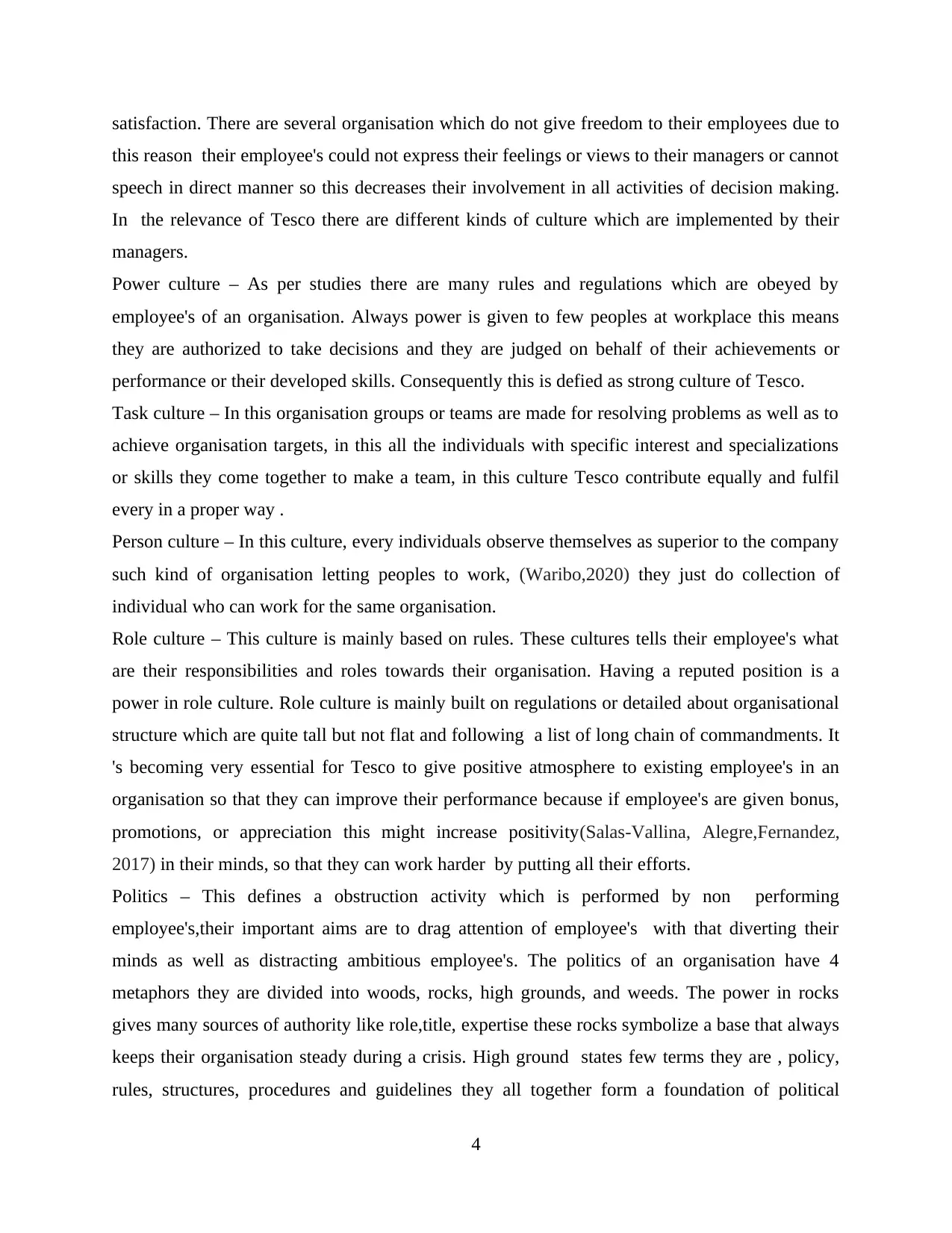
satisfaction. There are several organisation which do not give freedom to their employees due to
this reason their employee's could not express their feelings or views to their managers or cannot
speech in direct manner so this decreases their involvement in all activities of decision making.
In the relevance of Tesco there are different kinds of culture which are implemented by their
managers.
Power culture – As per studies there are many rules and regulations which are obeyed by
employee's of an organisation. Always power is given to few peoples at workplace this means
they are authorized to take decisions and they are judged on behalf of their achievements or
performance or their developed skills. Consequently this is defied as strong culture of Tesco.
Task culture – In this organisation groups or teams are made for resolving problems as well as to
achieve organisation targets, in this all the individuals with specific interest and specializations
or skills they come together to make a team, in this culture Tesco contribute equally and fulfil
every in a proper way .
Person culture – In this culture, every individuals observe themselves as superior to the company
such kind of organisation letting peoples to work, (Waribo,2020) they just do collection of
individual who can work for the same organisation.
Role culture – This culture is mainly based on rules. These cultures tells their employee's what
are their responsibilities and roles towards their organisation. Having a reputed position is a
power in role culture. Role culture is mainly built on regulations or detailed about organisational
structure which are quite tall but not flat and following a list of long chain of commandments. It
's becoming very essential for Tesco to give positive atmosphere to existing employee's in an
organisation so that they can improve their performance because if employee's are given bonus,
promotions, or appreciation this might increase positivity(Salas-Vallina, Alegre,Fernandez,
2017) in their minds, so that they can work harder by putting all their efforts.
Politics – This defines a obstruction activity which is performed by non performing
employee's,their important aims are to drag attention of employee's with that diverting their
minds as well as distracting ambitious employee's. The politics of an organisation have 4
metaphors they are divided into woods, rocks, high grounds, and weeds. The power in rocks
gives many sources of authority like role,title, expertise these rocks symbolize a base that always
keeps their organisation steady during a crisis. High ground states few terms they are , policy,
rules, structures, procedures and guidelines they all together form a foundation of political
4
this reason their employee's could not express their feelings or views to their managers or cannot
speech in direct manner so this decreases their involvement in all activities of decision making.
In the relevance of Tesco there are different kinds of culture which are implemented by their
managers.
Power culture – As per studies there are many rules and regulations which are obeyed by
employee's of an organisation. Always power is given to few peoples at workplace this means
they are authorized to take decisions and they are judged on behalf of their achievements or
performance or their developed skills. Consequently this is defied as strong culture of Tesco.
Task culture – In this organisation groups or teams are made for resolving problems as well as to
achieve organisation targets, in this all the individuals with specific interest and specializations
or skills they come together to make a team, in this culture Tesco contribute equally and fulfil
every in a proper way .
Person culture – In this culture, every individuals observe themselves as superior to the company
such kind of organisation letting peoples to work, (Waribo,2020) they just do collection of
individual who can work for the same organisation.
Role culture – This culture is mainly based on rules. These cultures tells their employee's what
are their responsibilities and roles towards their organisation. Having a reputed position is a
power in role culture. Role culture is mainly built on regulations or detailed about organisational
structure which are quite tall but not flat and following a list of long chain of commandments. It
's becoming very essential for Tesco to give positive atmosphere to existing employee's in an
organisation so that they can improve their performance because if employee's are given bonus,
promotions, or appreciation this might increase positivity(Salas-Vallina, Alegre,Fernandez,
2017) in their minds, so that they can work harder by putting all their efforts.
Politics – This defines a obstruction activity which is performed by non performing
employee's,their important aims are to drag attention of employee's with that diverting their
minds as well as distracting ambitious employee's. The politics of an organisation have 4
metaphors they are divided into woods, rocks, high grounds, and weeds. The power in rocks
gives many sources of authority like role,title, expertise these rocks symbolize a base that always
keeps their organisation steady during a crisis. High ground states few terms they are , policy,
rules, structures, procedures and guidelines they all together form a foundation of political
4
Paraphrase This Document
Need a fresh take? Get an instant paraphrase of this document with our AI Paraphraser
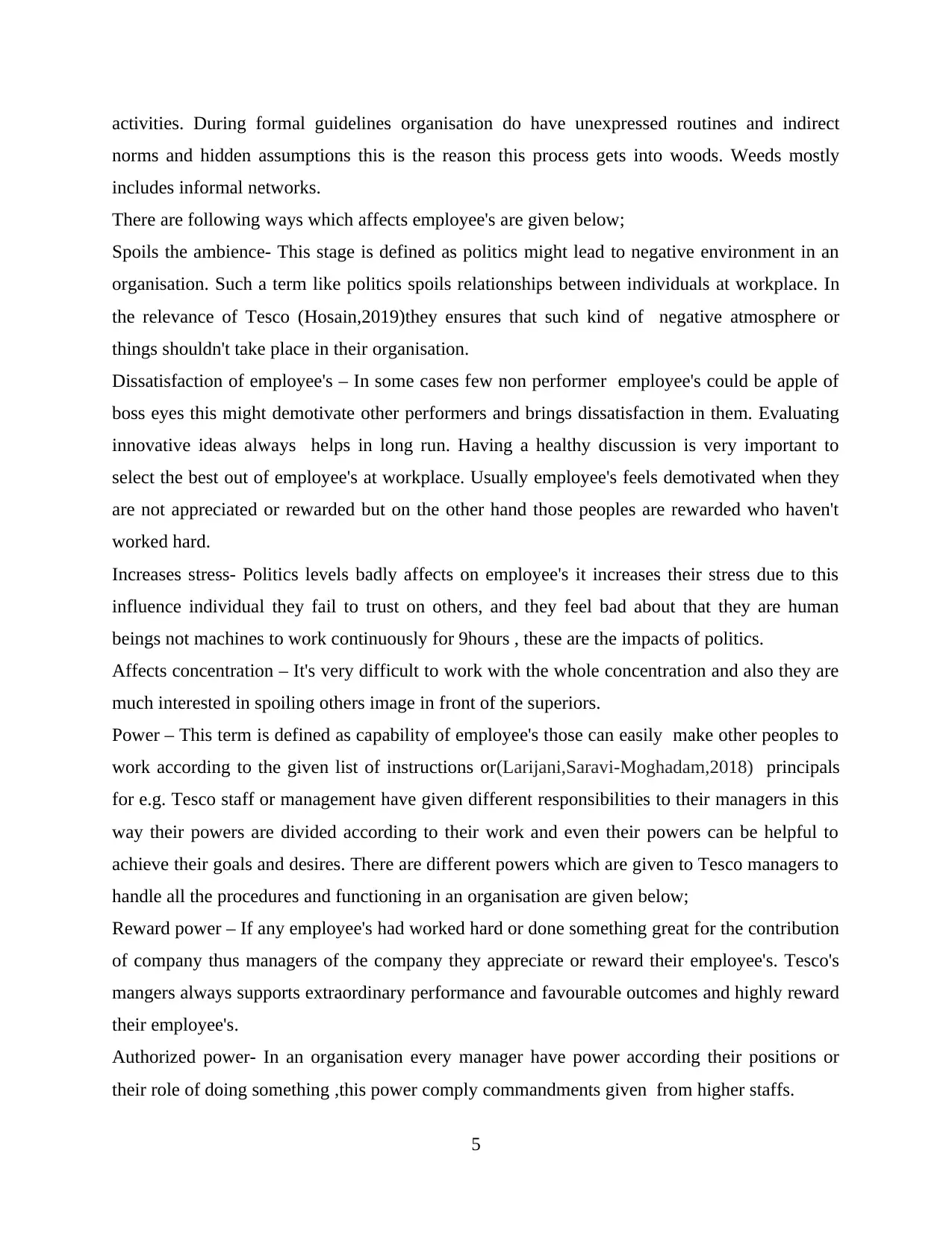
activities. During formal guidelines organisation do have unexpressed routines and indirect
norms and hidden assumptions this is the reason this process gets into woods. Weeds mostly
includes informal networks.
There are following ways which affects employee's are given below;
Spoils the ambience- This stage is defined as politics might lead to negative environment in an
organisation. Such a term like politics spoils relationships between individuals at workplace. In
the relevance of Tesco (Hosain,2019)they ensures that such kind of negative atmosphere or
things shouldn't take place in their organisation.
Dissatisfaction of employee's – In some cases few non performer employee's could be apple of
boss eyes this might demotivate other performers and brings dissatisfaction in them. Evaluating
innovative ideas always helps in long run. Having a healthy discussion is very important to
select the best out of employee's at workplace. Usually employee's feels demotivated when they
are not appreciated or rewarded but on the other hand those peoples are rewarded who haven't
worked hard.
Increases stress- Politics levels badly affects on employee's it increases their stress due to this
influence individual they fail to trust on others, and they feel bad about that they are human
beings not machines to work continuously for 9hours , these are the impacts of politics.
Affects concentration – It's very difficult to work with the whole concentration and also they are
much interested in spoiling others image in front of the superiors.
Power – This term is defined as capability of employee's those can easily make other peoples to
work according to the given list of instructions or(Larijani,Saravi-Moghadam,2018) principals
for e.g. Tesco staff or management have given different responsibilities to their managers in this
way their powers are divided according to their work and even their powers can be helpful to
achieve their goals and desires. There are different powers which are given to Tesco managers to
handle all the procedures and functioning in an organisation are given below;
Reward power – If any employee's had worked hard or done something great for the contribution
of company thus managers of the company they appreciate or reward their employee's. Tesco's
mangers always supports extraordinary performance and favourable outcomes and highly reward
their employee's.
Authorized power- In an organisation every manager have power according their positions or
their role of doing something ,this power comply commandments given from higher staffs.
5
norms and hidden assumptions this is the reason this process gets into woods. Weeds mostly
includes informal networks.
There are following ways which affects employee's are given below;
Spoils the ambience- This stage is defined as politics might lead to negative environment in an
organisation. Such a term like politics spoils relationships between individuals at workplace. In
the relevance of Tesco (Hosain,2019)they ensures that such kind of negative atmosphere or
things shouldn't take place in their organisation.
Dissatisfaction of employee's – In some cases few non performer employee's could be apple of
boss eyes this might demotivate other performers and brings dissatisfaction in them. Evaluating
innovative ideas always helps in long run. Having a healthy discussion is very important to
select the best out of employee's at workplace. Usually employee's feels demotivated when they
are not appreciated or rewarded but on the other hand those peoples are rewarded who haven't
worked hard.
Increases stress- Politics levels badly affects on employee's it increases their stress due to this
influence individual they fail to trust on others, and they feel bad about that they are human
beings not machines to work continuously for 9hours , these are the impacts of politics.
Affects concentration – It's very difficult to work with the whole concentration and also they are
much interested in spoiling others image in front of the superiors.
Power – This term is defined as capability of employee's those can easily make other peoples to
work according to the given list of instructions or(Larijani,Saravi-Moghadam,2018) principals
for e.g. Tesco staff or management have given different responsibilities to their managers in this
way their powers are divided according to their work and even their powers can be helpful to
achieve their goals and desires. There are different powers which are given to Tesco managers to
handle all the procedures and functioning in an organisation are given below;
Reward power – If any employee's had worked hard or done something great for the contribution
of company thus managers of the company they appreciate or reward their employee's. Tesco's
mangers always supports extraordinary performance and favourable outcomes and highly reward
their employee's.
Authorized power- In an organisation every manager have power according their positions or
their role of doing something ,this power comply commandments given from higher staffs.
5
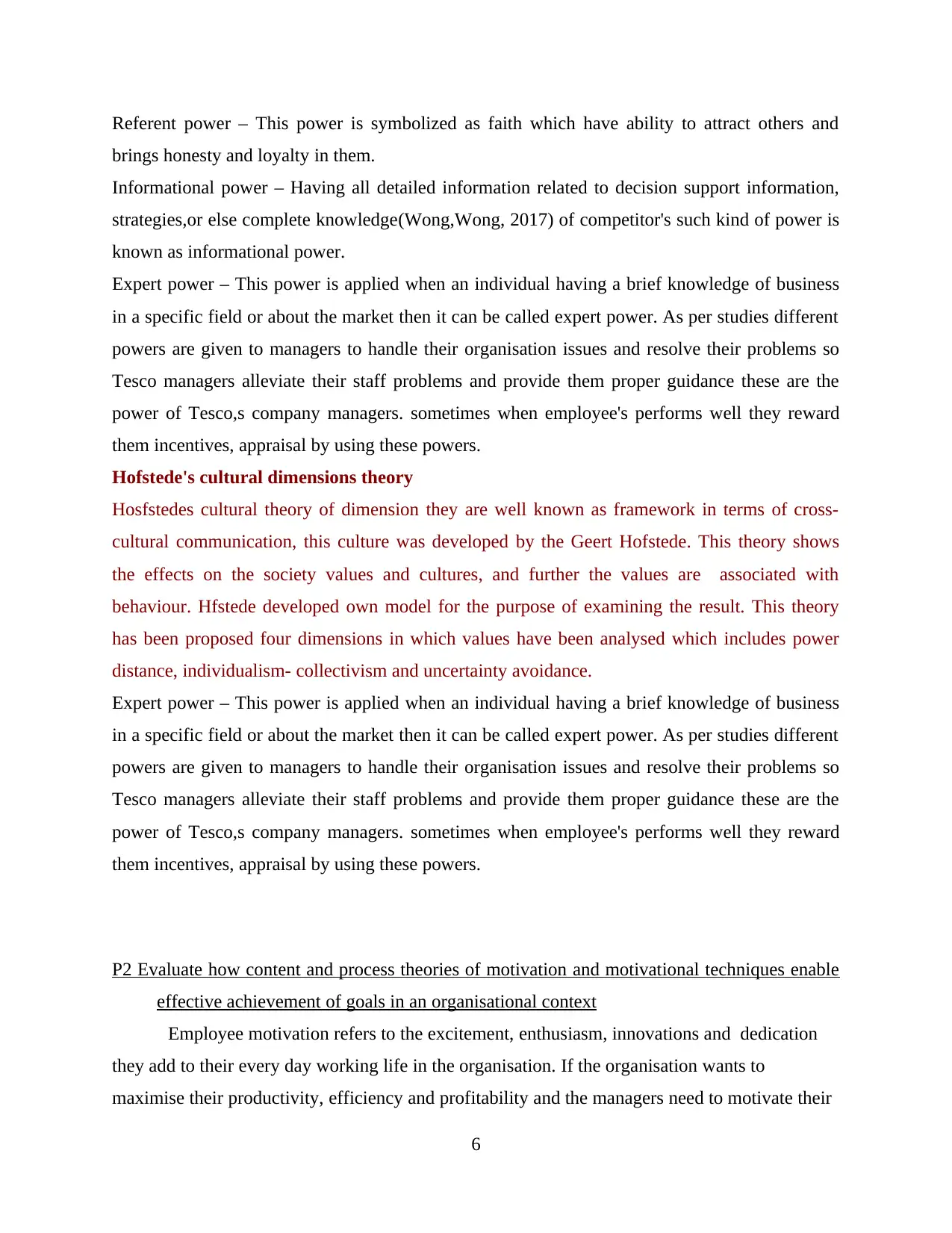
Referent power – This power is symbolized as faith which have ability to attract others and
brings honesty and loyalty in them.
Informational power – Having all detailed information related to decision support information,
strategies,or else complete knowledge(Wong,Wong, 2017) of competitor's such kind of power is
known as informational power.
Expert power – This power is applied when an individual having a brief knowledge of business
in a specific field or about the market then it can be called expert power. As per studies different
powers are given to managers to handle their organisation issues and resolve their problems so
Tesco managers alleviate their staff problems and provide them proper guidance these are the
power of Tesco,s company managers. sometimes when employee's performs well they reward
them incentives, appraisal by using these powers.
Hofstede's cultural dimensions theory
Hosfstedes cultural theory of dimension they are well known as framework in terms of cross-
cultural communication, this culture was developed by the Geert Hofstede. This theory shows
the effects on the society values and cultures, and further the values are associated with
behaviour. Hfstede developed own model for the purpose of examining the result. This theory
has been proposed four dimensions in which values have been analysed which includes power
distance, individualism- collectivism and uncertainty avoidance.
Expert power – This power is applied when an individual having a brief knowledge of business
in a specific field or about the market then it can be called expert power. As per studies different
powers are given to managers to handle their organisation issues and resolve their problems so
Tesco managers alleviate their staff problems and provide them proper guidance these are the
power of Tesco,s company managers. sometimes when employee's performs well they reward
them incentives, appraisal by using these powers.
P2 Evaluate how content and process theories of motivation and motivational techniques enable
effective achievement of goals in an organisational context
Employee motivation refers to the excitement, enthusiasm, innovations and dedication
they add to their every day working life in the organisation. If the organisation wants to
maximise their productivity, efficiency and profitability and the managers need to motivate their
6
brings honesty and loyalty in them.
Informational power – Having all detailed information related to decision support information,
strategies,or else complete knowledge(Wong,Wong, 2017) of competitor's such kind of power is
known as informational power.
Expert power – This power is applied when an individual having a brief knowledge of business
in a specific field or about the market then it can be called expert power. As per studies different
powers are given to managers to handle their organisation issues and resolve their problems so
Tesco managers alleviate their staff problems and provide them proper guidance these are the
power of Tesco,s company managers. sometimes when employee's performs well they reward
them incentives, appraisal by using these powers.
Hofstede's cultural dimensions theory
Hosfstedes cultural theory of dimension they are well known as framework in terms of cross-
cultural communication, this culture was developed by the Geert Hofstede. This theory shows
the effects on the society values and cultures, and further the values are associated with
behaviour. Hfstede developed own model for the purpose of examining the result. This theory
has been proposed four dimensions in which values have been analysed which includes power
distance, individualism- collectivism and uncertainty avoidance.
Expert power – This power is applied when an individual having a brief knowledge of business
in a specific field or about the market then it can be called expert power. As per studies different
powers are given to managers to handle their organisation issues and resolve their problems so
Tesco managers alleviate their staff problems and provide them proper guidance these are the
power of Tesco,s company managers. sometimes when employee's performs well they reward
them incentives, appraisal by using these powers.
P2 Evaluate how content and process theories of motivation and motivational techniques enable
effective achievement of goals in an organisational context
Employee motivation refers to the excitement, enthusiasm, innovations and dedication
they add to their every day working life in the organisation. If the organisation wants to
maximise their productivity, efficiency and profitability and the managers need to motivate their
6
⊘ This is a preview!⊘
Do you want full access?
Subscribe today to unlock all pages.

Trusted by 1+ million students worldwide
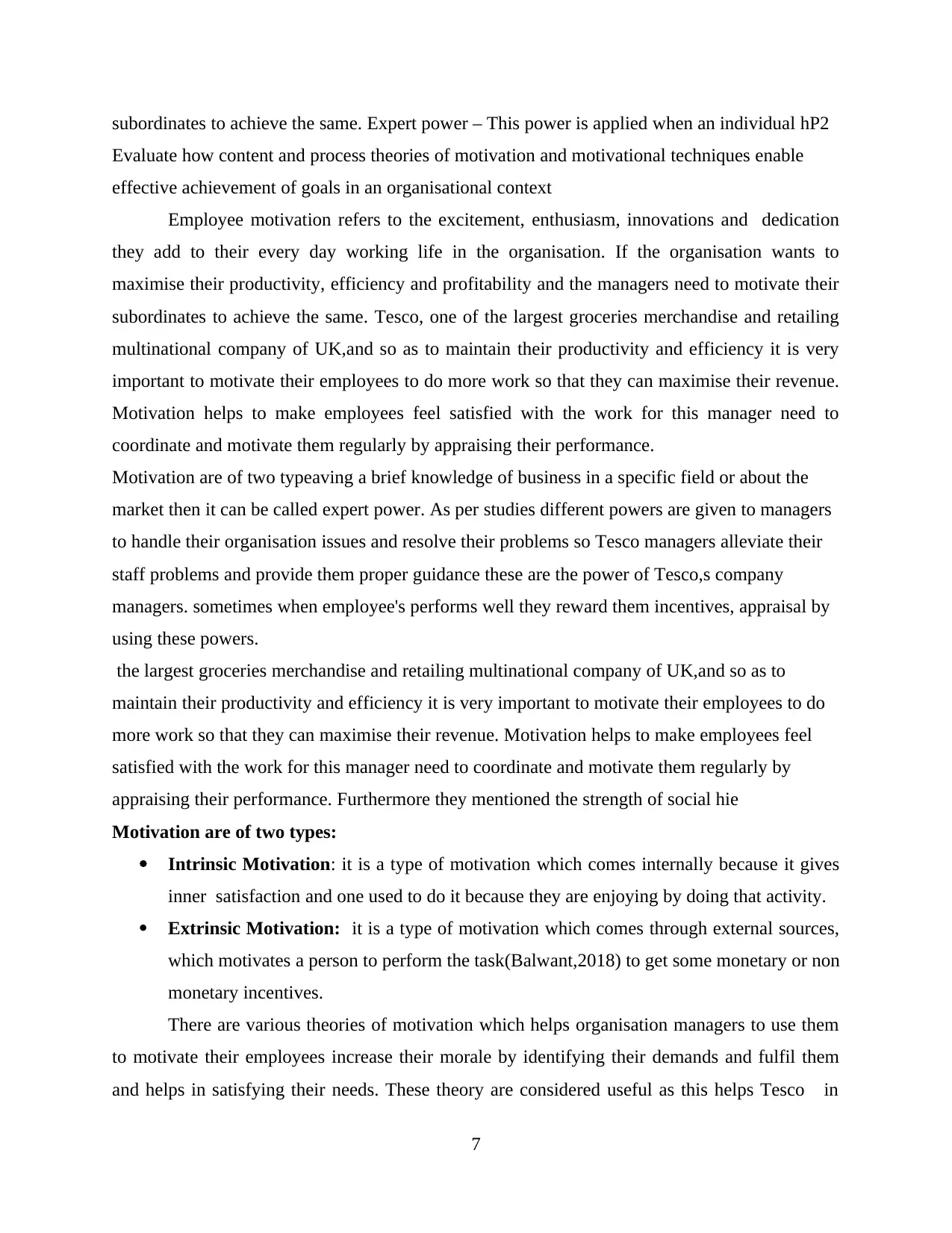
subordinates to achieve the same. Expert power – This power is applied when an individual hP2
Evaluate how content and process theories of motivation and motivational techniques enable
effective achievement of goals in an organisational context
Employee motivation refers to the excitement, enthusiasm, innovations and dedication
they add to their every day working life in the organisation. If the organisation wants to
maximise their productivity, efficiency and profitability and the managers need to motivate their
subordinates to achieve the same. Tesco, one of the largest groceries merchandise and retailing
multinational company of UK,and so as to maintain their productivity and efficiency it is very
important to motivate their employees to do more work so that they can maximise their revenue.
Motivation helps to make employees feel satisfied with the work for this manager need to
coordinate and motivate them regularly by appraising their performance.
Motivation are of two typeaving a brief knowledge of business in a specific field or about the
market then it can be called expert power. As per studies different powers are given to managers
to handle their organisation issues and resolve their problems so Tesco managers alleviate their
staff problems and provide them proper guidance these are the power of Tesco,s company
managers. sometimes when employee's performs well they reward them incentives, appraisal by
using these powers.
the largest groceries merchandise and retailing multinational company of UK,and so as to
maintain their productivity and efficiency it is very important to motivate their employees to do
more work so that they can maximise their revenue. Motivation helps to make employees feel
satisfied with the work for this manager need to coordinate and motivate them regularly by
appraising their performance. Furthermore they mentioned the strength of social hie
Motivation are of two types:
Intrinsic Motivation: it is a type of motivation which comes internally because it gives
inner satisfaction and one used to do it because they are enjoying by doing that activity.
Extrinsic Motivation: it is a type of motivation which comes through external sources,
which motivates a person to perform the task(Balwant,2018) to get some monetary or non
monetary incentives.
There are various theories of motivation which helps organisation managers to use them
to motivate their employees increase their morale by identifying their demands and fulfil them
and helps in satisfying their needs. These theory are considered useful as this helps Tesco in
7
Evaluate how content and process theories of motivation and motivational techniques enable
effective achievement of goals in an organisational context
Employee motivation refers to the excitement, enthusiasm, innovations and dedication
they add to their every day working life in the organisation. If the organisation wants to
maximise their productivity, efficiency and profitability and the managers need to motivate their
subordinates to achieve the same. Tesco, one of the largest groceries merchandise and retailing
multinational company of UK,and so as to maintain their productivity and efficiency it is very
important to motivate their employees to do more work so that they can maximise their revenue.
Motivation helps to make employees feel satisfied with the work for this manager need to
coordinate and motivate them regularly by appraising their performance.
Motivation are of two typeaving a brief knowledge of business in a specific field or about the
market then it can be called expert power. As per studies different powers are given to managers
to handle their organisation issues and resolve their problems so Tesco managers alleviate their
staff problems and provide them proper guidance these are the power of Tesco,s company
managers. sometimes when employee's performs well they reward them incentives, appraisal by
using these powers.
the largest groceries merchandise and retailing multinational company of UK,and so as to
maintain their productivity and efficiency it is very important to motivate their employees to do
more work so that they can maximise their revenue. Motivation helps to make employees feel
satisfied with the work for this manager need to coordinate and motivate them regularly by
appraising their performance. Furthermore they mentioned the strength of social hie
Motivation are of two types:
Intrinsic Motivation: it is a type of motivation which comes internally because it gives
inner satisfaction and one used to do it because they are enjoying by doing that activity.
Extrinsic Motivation: it is a type of motivation which comes through external sources,
which motivates a person to perform the task(Balwant,2018) to get some monetary or non
monetary incentives.
There are various theories of motivation which helps organisation managers to use them
to motivate their employees increase their morale by identifying their demands and fulfil them
and helps in satisfying their needs. These theory are considered useful as this helps Tesco in
7
Paraphrase This Document
Need a fresh take? Get an instant paraphrase of this document with our AI Paraphraser
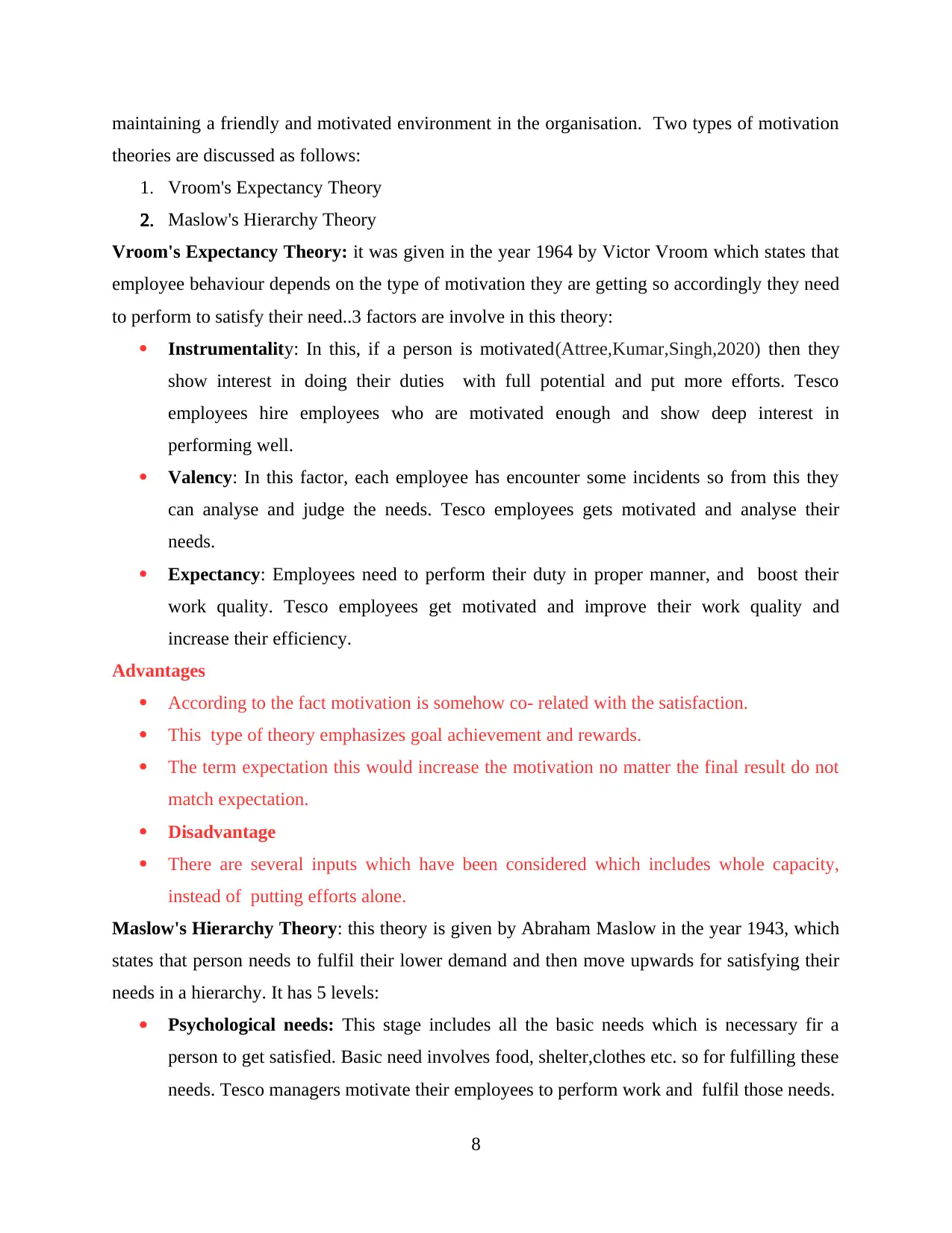
maintaining a friendly and motivated environment in the organisation. Two types of motivation
theories are discussed as follows:
1. Vroom's Expectancy Theory
2. Maslow's Hierarchy Theory
Vroom's Expectancy Theory: it was given in the year 1964 by Victor Vroom which states that
employee behaviour depends on the type of motivation they are getting so accordingly they need
to perform to satisfy their need..3 factors are involve in this theory:
Instrumentality: In this, if a person is motivated(Attree,Kumar,Singh,2020) then they
show interest in doing their duties with full potential and put more efforts. Tesco
employees hire employees who are motivated enough and show deep interest in
performing well.
Valency: In this factor, each employee has encounter some incidents so from this they
can analyse and judge the needs. Tesco employees gets motivated and analyse their
needs.
Expectancy: Employees need to perform their duty in proper manner, and boost their
work quality. Tesco employees get motivated and improve their work quality and
increase their efficiency.
Advantages
According to the fact motivation is somehow co- related with the satisfaction.
This type of theory emphasizes goal achievement and rewards.
The term expectation this would increase the motivation no matter the final result do not
match expectation.
Disadvantage
There are several inputs which have been considered which includes whole capacity,
instead of putting efforts alone.
Maslow's Hierarchy Theory: this theory is given by Abraham Maslow in the year 1943, which
states that person needs to fulfil their lower demand and then move upwards for satisfying their
needs in a hierarchy. It has 5 levels:
Psychological needs: This stage includes all the basic needs which is necessary fir a
person to get satisfied. Basic need involves food, shelter,clothes etc. so for fulfilling these
needs. Tesco managers motivate their employees to perform work and fulfil those needs.
8
theories are discussed as follows:
1. Vroom's Expectancy Theory
2. Maslow's Hierarchy Theory
Vroom's Expectancy Theory: it was given in the year 1964 by Victor Vroom which states that
employee behaviour depends on the type of motivation they are getting so accordingly they need
to perform to satisfy their need..3 factors are involve in this theory:
Instrumentality: In this, if a person is motivated(Attree,Kumar,Singh,2020) then they
show interest in doing their duties with full potential and put more efforts. Tesco
employees hire employees who are motivated enough and show deep interest in
performing well.
Valency: In this factor, each employee has encounter some incidents so from this they
can analyse and judge the needs. Tesco employees gets motivated and analyse their
needs.
Expectancy: Employees need to perform their duty in proper manner, and boost their
work quality. Tesco employees get motivated and improve their work quality and
increase their efficiency.
Advantages
According to the fact motivation is somehow co- related with the satisfaction.
This type of theory emphasizes goal achievement and rewards.
The term expectation this would increase the motivation no matter the final result do not
match expectation.
Disadvantage
There are several inputs which have been considered which includes whole capacity,
instead of putting efforts alone.
Maslow's Hierarchy Theory: this theory is given by Abraham Maslow in the year 1943, which
states that person needs to fulfil their lower demand and then move upwards for satisfying their
needs in a hierarchy. It has 5 levels:
Psychological needs: This stage includes all the basic needs which is necessary fir a
person to get satisfied. Basic need involves food, shelter,clothes etc. so for fulfilling these
needs. Tesco managers motivate their employees to perform work and fulfil those needs.
8
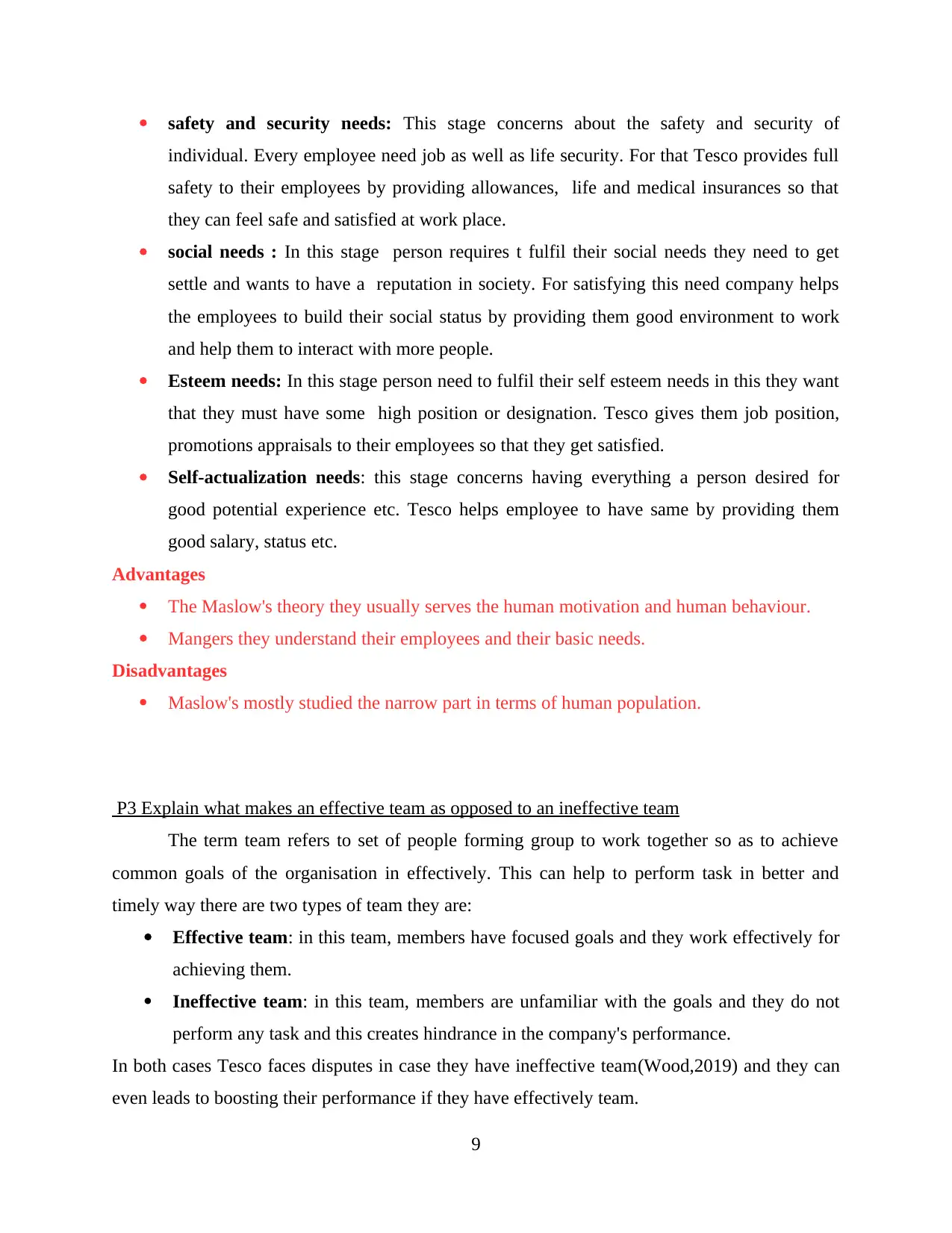
safety and security needs: This stage concerns about the safety and security of
individual. Every employee need job as well as life security. For that Tesco provides full
safety to their employees by providing allowances, life and medical insurances so that
they can feel safe and satisfied at work place.
social needs : In this stage person requires t fulfil their social needs they need to get
settle and wants to have a reputation in society. For satisfying this need company helps
the employees to build their social status by providing them good environment to work
and help them to interact with more people.
Esteem needs: In this stage person need to fulfil their self esteem needs in this they want
that they must have some high position or designation. Tesco gives them job position,
promotions appraisals to their employees so that they get satisfied.
Self-actualization needs: this stage concerns having everything a person desired for
good potential experience etc. Tesco helps employee to have same by providing them
good salary, status etc.
Advantages
The Maslow's theory they usually serves the human motivation and human behaviour.
Mangers they understand their employees and their basic needs.
Disadvantages
Maslow's mostly studied the narrow part in terms of human population.
P3 Explain what makes an effective team as opposed to an ineffective team
The term team refers to set of people forming group to work together so as to achieve
common goals of the organisation in effectively. This can help to perform task in better and
timely way there are two types of team they are:
Effective team: in this team, members have focused goals and they work effectively for
achieving them.
Ineffective team: in this team, members are unfamiliar with the goals and they do not
perform any task and this creates hindrance in the company's performance.
In both cases Tesco faces disputes in case they have ineffective team(Wood,2019) and they can
even leads to boosting their performance if they have effectively team.
9
individual. Every employee need job as well as life security. For that Tesco provides full
safety to their employees by providing allowances, life and medical insurances so that
they can feel safe and satisfied at work place.
social needs : In this stage person requires t fulfil their social needs they need to get
settle and wants to have a reputation in society. For satisfying this need company helps
the employees to build their social status by providing them good environment to work
and help them to interact with more people.
Esteem needs: In this stage person need to fulfil their self esteem needs in this they want
that they must have some high position or designation. Tesco gives them job position,
promotions appraisals to their employees so that they get satisfied.
Self-actualization needs: this stage concerns having everything a person desired for
good potential experience etc. Tesco helps employee to have same by providing them
good salary, status etc.
Advantages
The Maslow's theory they usually serves the human motivation and human behaviour.
Mangers they understand their employees and their basic needs.
Disadvantages
Maslow's mostly studied the narrow part in terms of human population.
P3 Explain what makes an effective team as opposed to an ineffective team
The term team refers to set of people forming group to work together so as to achieve
common goals of the organisation in effectively. This can help to perform task in better and
timely way there are two types of team they are:
Effective team: in this team, members have focused goals and they work effectively for
achieving them.
Ineffective team: in this team, members are unfamiliar with the goals and they do not
perform any task and this creates hindrance in the company's performance.
In both cases Tesco faces disputes in case they have ineffective team(Wood,2019) and they can
even leads to boosting their performance if they have effectively team.
9
⊘ This is a preview!⊘
Do you want full access?
Subscribe today to unlock all pages.

Trusted by 1+ million students worldwide
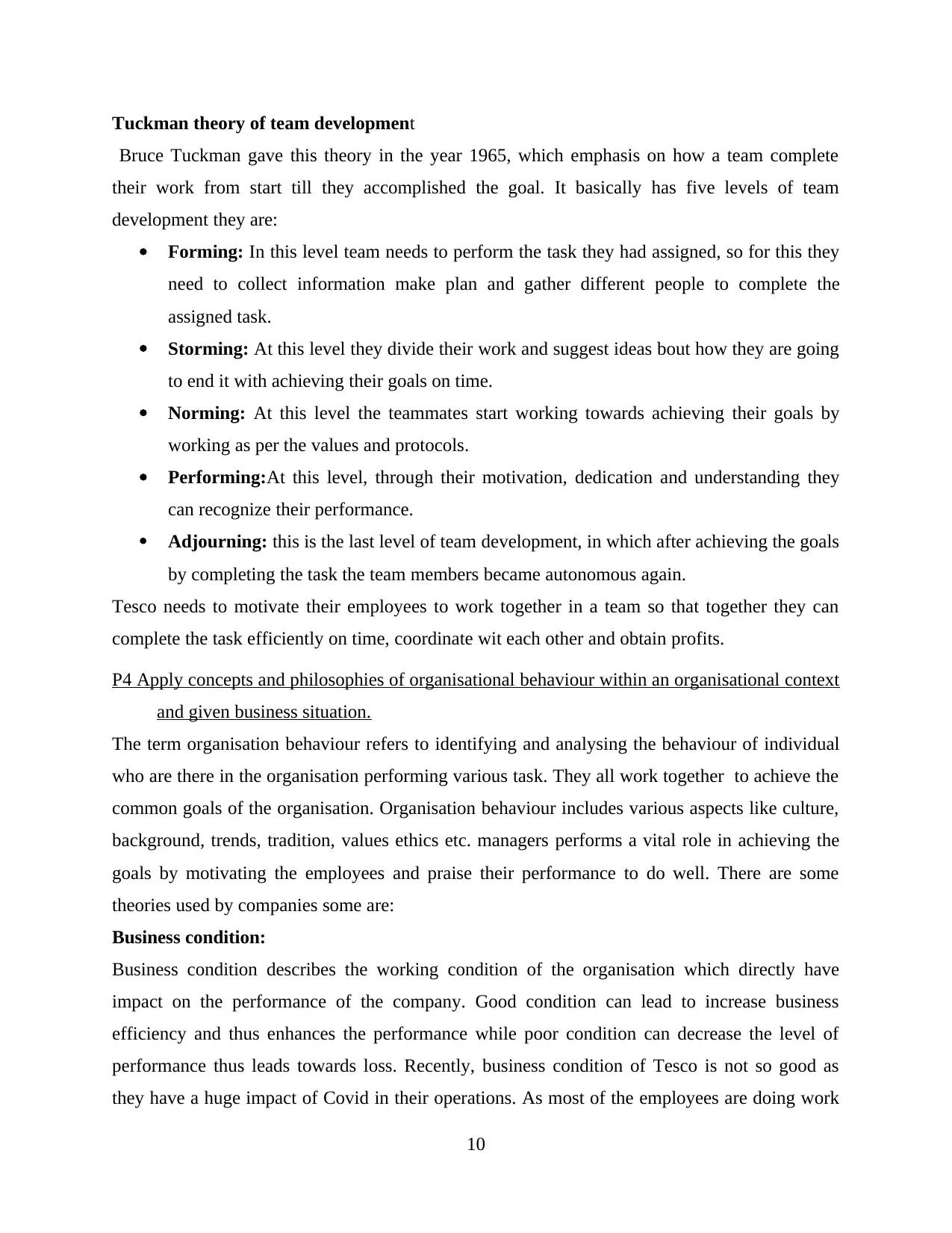
Tuckman theory of team development
Bruce Tuckman gave this theory in the year 1965, which emphasis on how a team complete
their work from start till they accomplished the goal. It basically has five levels of team
development they are:
Forming: In this level team needs to perform the task they had assigned, so for this they
need to collect information make plan and gather different people to complete the
assigned task.
Storming: At this level they divide their work and suggest ideas bout how they are going
to end it with achieving their goals on time.
Norming: At this level the teammates start working towards achieving their goals by
working as per the values and protocols.
Performing:At this level, through their motivation, dedication and understanding they
can recognize their performance.
Adjourning: this is the last level of team development, in which after achieving the goals
by completing the task the team members became autonomous again.
Tesco needs to motivate their employees to work together in a team so that together they can
complete the task efficiently on time, coordinate wit each other and obtain profits.
P4 Apply concepts and philosophies of organisational behaviour within an organisational context
and given business situation.
The term organisation behaviour refers to identifying and analysing the behaviour of individual
who are there in the organisation performing various task. They all work together to achieve the
common goals of the organisation. Organisation behaviour includes various aspects like culture,
background, trends, tradition, values ethics etc. managers performs a vital role in achieving the
goals by motivating the employees and praise their performance to do well. There are some
theories used by companies some are:
Business condition:
Business condition describes the working condition of the organisation which directly have
impact on the performance of the company. Good condition can lead to increase business
efficiency and thus enhances the performance while poor condition can decrease the level of
performance thus leads towards loss. Recently, business condition of Tesco is not so good as
they have a huge impact of Covid in their operations. As most of the employees are doing work
10
Bruce Tuckman gave this theory in the year 1965, which emphasis on how a team complete
their work from start till they accomplished the goal. It basically has five levels of team
development they are:
Forming: In this level team needs to perform the task they had assigned, so for this they
need to collect information make plan and gather different people to complete the
assigned task.
Storming: At this level they divide their work and suggest ideas bout how they are going
to end it with achieving their goals on time.
Norming: At this level the teammates start working towards achieving their goals by
working as per the values and protocols.
Performing:At this level, through their motivation, dedication and understanding they
can recognize their performance.
Adjourning: this is the last level of team development, in which after achieving the goals
by completing the task the team members became autonomous again.
Tesco needs to motivate their employees to work together in a team so that together they can
complete the task efficiently on time, coordinate wit each other and obtain profits.
P4 Apply concepts and philosophies of organisational behaviour within an organisational context
and given business situation.
The term organisation behaviour refers to identifying and analysing the behaviour of individual
who are there in the organisation performing various task. They all work together to achieve the
common goals of the organisation. Organisation behaviour includes various aspects like culture,
background, trends, tradition, values ethics etc. managers performs a vital role in achieving the
goals by motivating the employees and praise their performance to do well. There are some
theories used by companies some are:
Business condition:
Business condition describes the working condition of the organisation which directly have
impact on the performance of the company. Good condition can lead to increase business
efficiency and thus enhances the performance while poor condition can decrease the level of
performance thus leads towards loss. Recently, business condition of Tesco is not so good as
they have a huge impact of Covid in their operations. As most of the employees are doing work
10
Paraphrase This Document
Need a fresh take? Get an instant paraphrase of this document with our AI Paraphraser
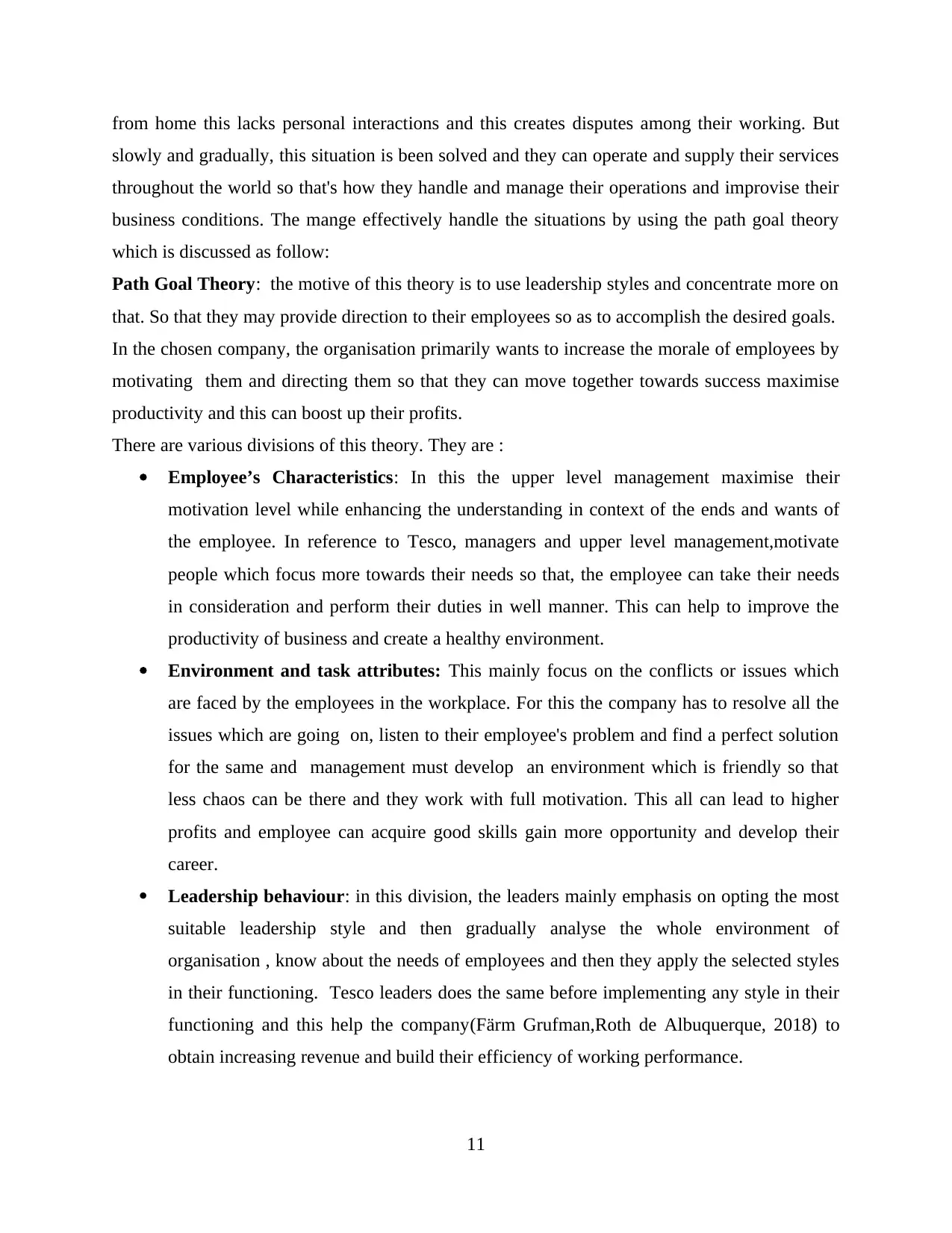
from home this lacks personal interactions and this creates disputes among their working. But
slowly and gradually, this situation is been solved and they can operate and supply their services
throughout the world so that's how they handle and manage their operations and improvise their
business conditions. The mange effectively handle the situations by using the path goal theory
which is discussed as follow:
Path Goal Theory: the motive of this theory is to use leadership styles and concentrate more on
that. So that they may provide direction to their employees so as to accomplish the desired goals.
In the chosen company, the organisation primarily wants to increase the morale of employees by
motivating them and directing them so that they can move together towards success maximise
productivity and this can boost up their profits.
There are various divisions of this theory. They are :
Employee’s Characteristics: In this the upper level management maximise their
motivation level while enhancing the understanding in context of the ends and wants of
the employee. In reference to Tesco, managers and upper level management,motivate
people which focus more towards their needs so that, the employee can take their needs
in consideration and perform their duties in well manner. This can help to improve the
productivity of business and create a healthy environment.
Environment and task attributes: This mainly focus on the conflicts or issues which
are faced by the employees in the workplace. For this the company has to resolve all the
issues which are going on, listen to their employee's problem and find a perfect solution
for the same and management must develop an environment which is friendly so that
less chaos can be there and they work with full motivation. This all can lead to higher
profits and employee can acquire good skills gain more opportunity and develop their
career.
Leadership behaviour: in this division, the leaders mainly emphasis on opting the most
suitable leadership style and then gradually analyse the whole environment of
organisation , know about the needs of employees and then they apply the selected styles
in their functioning. Tesco leaders does the same before implementing any style in their
functioning and this help the company(Färm Grufman,Roth de Albuquerque, 2018) to
obtain increasing revenue and build their efficiency of working performance.
11
slowly and gradually, this situation is been solved and they can operate and supply their services
throughout the world so that's how they handle and manage their operations and improvise their
business conditions. The mange effectively handle the situations by using the path goal theory
which is discussed as follow:
Path Goal Theory: the motive of this theory is to use leadership styles and concentrate more on
that. So that they may provide direction to their employees so as to accomplish the desired goals.
In the chosen company, the organisation primarily wants to increase the morale of employees by
motivating them and directing them so that they can move together towards success maximise
productivity and this can boost up their profits.
There are various divisions of this theory. They are :
Employee’s Characteristics: In this the upper level management maximise their
motivation level while enhancing the understanding in context of the ends and wants of
the employee. In reference to Tesco, managers and upper level management,motivate
people which focus more towards their needs so that, the employee can take their needs
in consideration and perform their duties in well manner. This can help to improve the
productivity of business and create a healthy environment.
Environment and task attributes: This mainly focus on the conflicts or issues which
are faced by the employees in the workplace. For this the company has to resolve all the
issues which are going on, listen to their employee's problem and find a perfect solution
for the same and management must develop an environment which is friendly so that
less chaos can be there and they work with full motivation. This all can lead to higher
profits and employee can acquire good skills gain more opportunity and develop their
career.
Leadership behaviour: in this division, the leaders mainly emphasis on opting the most
suitable leadership style and then gradually analyse the whole environment of
organisation , know about the needs of employees and then they apply the selected styles
in their functioning. Tesco leaders does the same before implementing any style in their
functioning and this help the company(Färm Grufman,Roth de Albuquerque, 2018) to
obtain increasing revenue and build their efficiency of working performance.
11
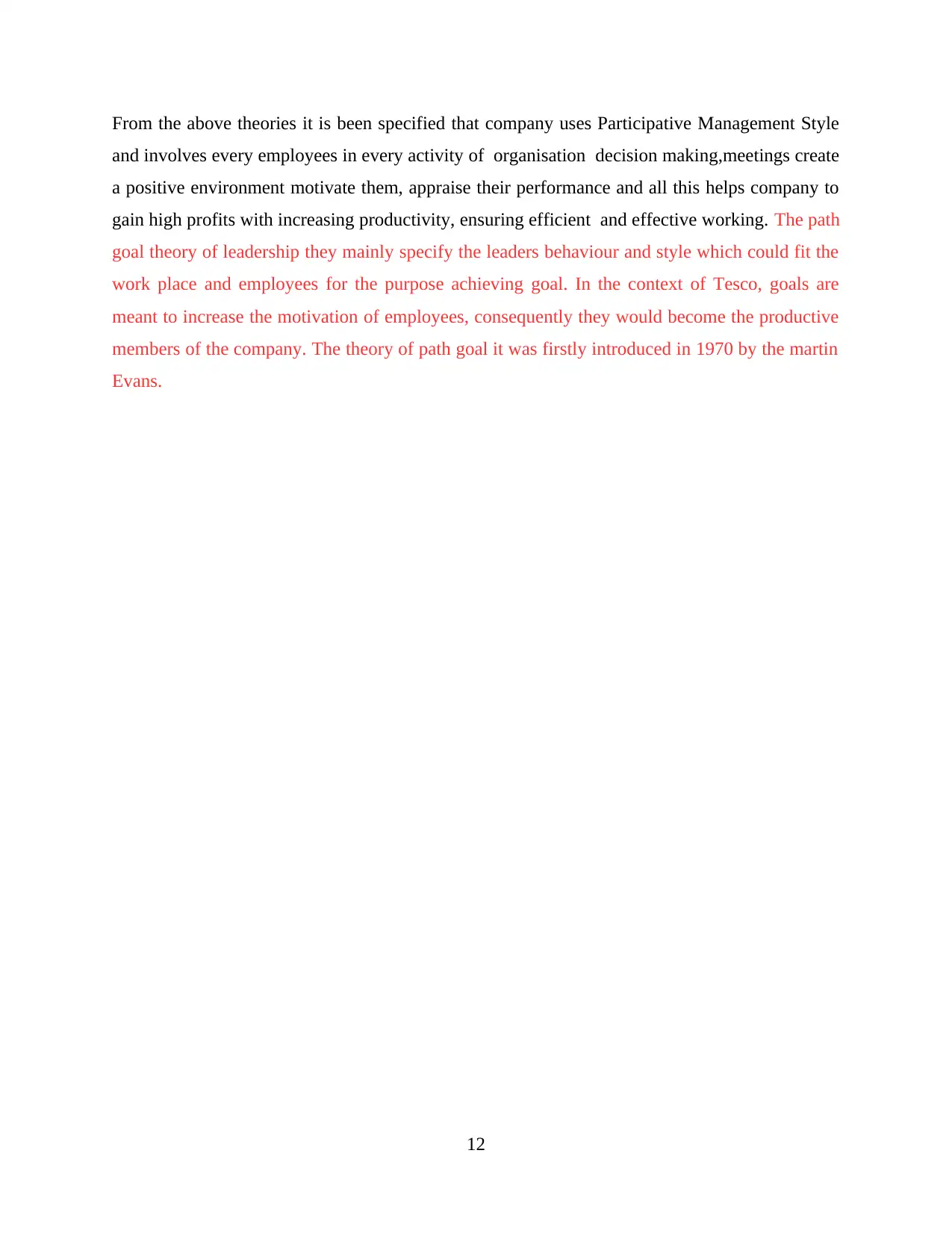
From the above theories it is been specified that company uses Participative Management Style
and involves every employees in every activity of organisation decision making,meetings create
a positive environment motivate them, appraise their performance and all this helps company to
gain high profits with increasing productivity, ensuring efficient and effective working. The path
goal theory of leadership they mainly specify the leaders behaviour and style which could fit the
work place and employees for the purpose achieving goal. In the context of Tesco, goals are
meant to increase the motivation of employees, consequently they would become the productive
members of the company. The theory of path goal it was firstly introduced in 1970 by the martin
Evans.
12
and involves every employees in every activity of organisation decision making,meetings create
a positive environment motivate them, appraise their performance and all this helps company to
gain high profits with increasing productivity, ensuring efficient and effective working. The path
goal theory of leadership they mainly specify the leaders behaviour and style which could fit the
work place and employees for the purpose achieving goal. In the context of Tesco, goals are
meant to increase the motivation of employees, consequently they would become the productive
members of the company. The theory of path goal it was firstly introduced in 1970 by the martin
Evans.
12
⊘ This is a preview!⊘
Do you want full access?
Subscribe today to unlock all pages.

Trusted by 1+ million students worldwide
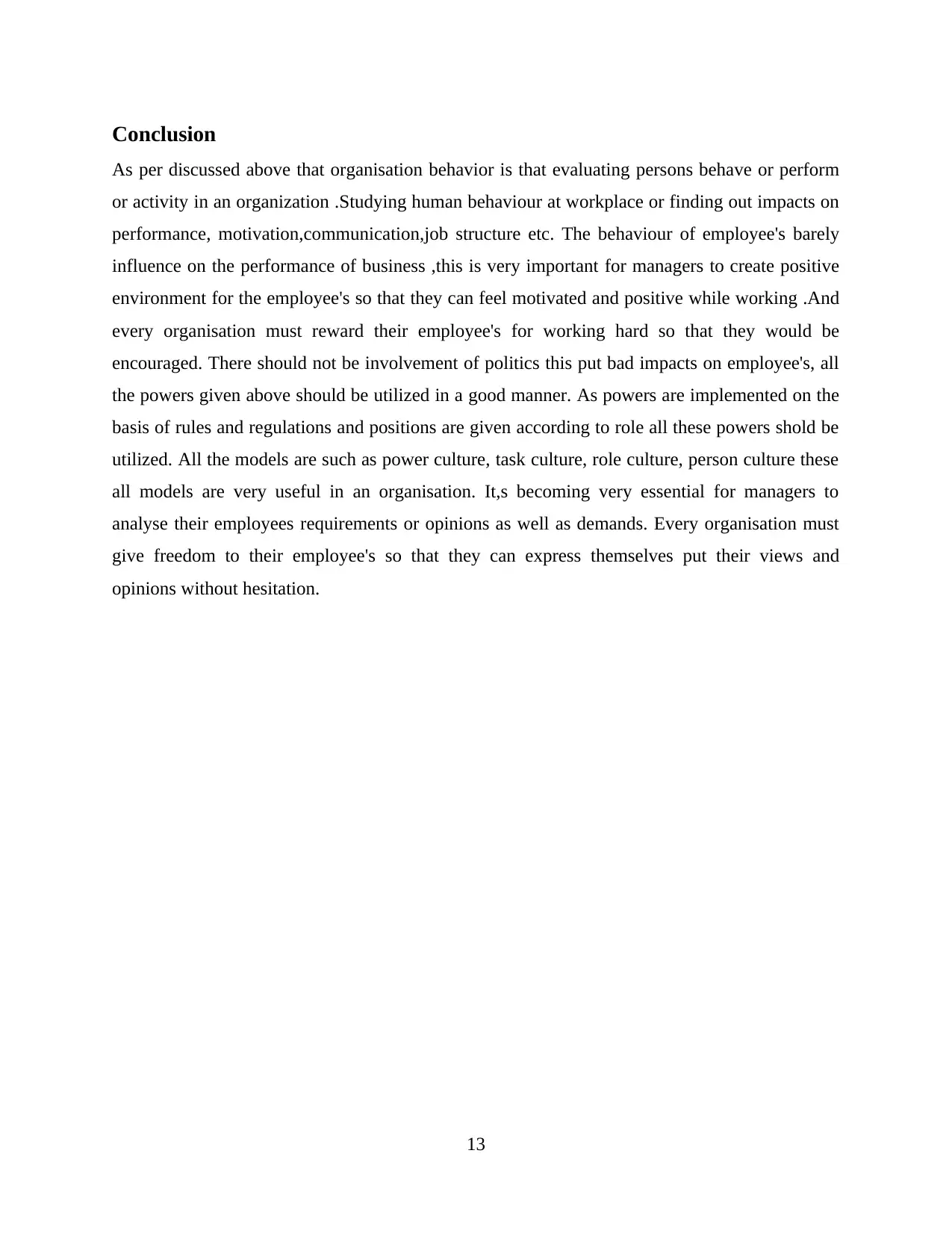
Conclusion
As per discussed above that organisation behavior is that evaluating persons behave or perform
or activity in an organization .Studying human behaviour at workplace or finding out impacts on
performance, motivation,communication,job structure etc. The behaviour of employee's barely
influence on the performance of business ,this is very important for managers to create positive
environment for the employee's so that they can feel motivated and positive while working .And
every organisation must reward their employee's for working hard so that they would be
encouraged. There should not be involvement of politics this put bad impacts on employee's, all
the powers given above should be utilized in a good manner. As powers are implemented on the
basis of rules and regulations and positions are given according to role all these powers shold be
utilized. All the models are such as power culture, task culture, role culture, person culture these
all models are very useful in an organisation. It,s becoming very essential for managers to
analyse their employees requirements or opinions as well as demands. Every organisation must
give freedom to their employee's so that they can express themselves put their views and
opinions without hesitation.
13
As per discussed above that organisation behavior is that evaluating persons behave or perform
or activity in an organization .Studying human behaviour at workplace or finding out impacts on
performance, motivation,communication,job structure etc. The behaviour of employee's barely
influence on the performance of business ,this is very important for managers to create positive
environment for the employee's so that they can feel motivated and positive while working .And
every organisation must reward their employee's for working hard so that they would be
encouraged. There should not be involvement of politics this put bad impacts on employee's, all
the powers given above should be utilized in a good manner. As powers are implemented on the
basis of rules and regulations and positions are given according to role all these powers shold be
utilized. All the models are such as power culture, task culture, role culture, person culture these
all models are very useful in an organisation. It,s becoming very essential for managers to
analyse their employees requirements or opinions as well as demands. Every organisation must
give freedom to their employee's so that they can express themselves put their views and
opinions without hesitation.
13
Paraphrase This Document
Need a fresh take? Get an instant paraphrase of this document with our AI Paraphraser
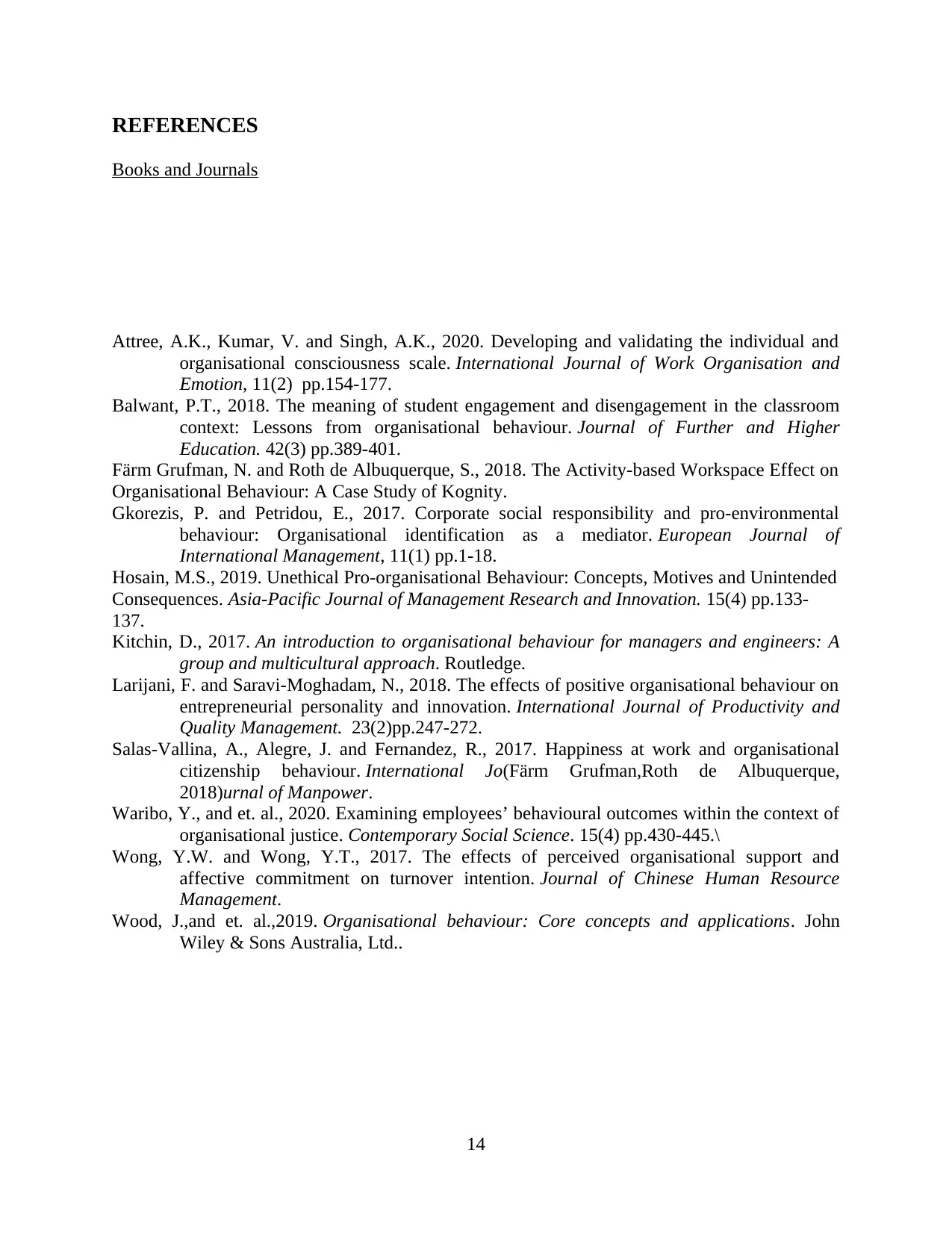
REFERENCES
Books and Journals
Attree, A.K., Kumar, V. and Singh, A.K., 2020. Developing and validating the individual and
organisational consciousness scale. International Journal of Work Organisation and
Emotion, 11(2) pp.154-177.
Balwant, P.T., 2018. The meaning of student engagement and disengagement in the classroom
context: Lessons from organisational behaviour. Journal of Further and Higher
Education. 42(3) pp.389-401.
Färm Grufman, N. and Roth de Albuquerque, S., 2018. The Activity-based Workspace Effect on
Organisational Behaviour: A Case Study of Kognity.
Gkorezis, P. and Petridou, E., 2017. Corporate social responsibility and pro-environmental
behaviour: Organisational identification as a mediator. European Journal of
International Management, 11(1) pp.1-18.
Hosain, M.S., 2019. Unethical Pro-organisational Behaviour: Concepts, Motives and Unintended
Consequences. Asia-Pacific Journal of Management Research and Innovation. 15(4) pp.133-
137.
Kitchin, D., 2017. An introduction to organisational behaviour for managers and engineers: A
group and multicultural approach. Routledge.
Larijani, F. and Saravi-Moghadam, N., 2018. The effects of positive organisational behaviour on
entrepreneurial personality and innovation. International Journal of Productivity and
Quality Management. 23(2)pp.247-272.
Salas-Vallina, A., Alegre, J. and Fernandez, R., 2017. Happiness at work and organisational
citizenship behaviour. International Jo(Färm Grufman,Roth de Albuquerque,
2018)urnal of Manpower.
Waribo, Y., and et. al., 2020. Examining employees’ behavioural outcomes within the context of
organisational justice. Contemporary Social Science. 15(4) pp.430-445.\
Wong, Y.W. and Wong, Y.T., 2017. The effects of perceived organisational support and
affective commitment on turnover intention. Journal of Chinese Human Resource
Management.
Wood, J.,and et. al.,2019. Organisational behaviour: Core concepts and applications. John
Wiley & Sons Australia, Ltd..
14
Books and Journals
Attree, A.K., Kumar, V. and Singh, A.K., 2020. Developing and validating the individual and
organisational consciousness scale. International Journal of Work Organisation and
Emotion, 11(2) pp.154-177.
Balwant, P.T., 2018. The meaning of student engagement and disengagement in the classroom
context: Lessons from organisational behaviour. Journal of Further and Higher
Education. 42(3) pp.389-401.
Färm Grufman, N. and Roth de Albuquerque, S., 2018. The Activity-based Workspace Effect on
Organisational Behaviour: A Case Study of Kognity.
Gkorezis, P. and Petridou, E., 2017. Corporate social responsibility and pro-environmental
behaviour: Organisational identification as a mediator. European Journal of
International Management, 11(1) pp.1-18.
Hosain, M.S., 2019. Unethical Pro-organisational Behaviour: Concepts, Motives and Unintended
Consequences. Asia-Pacific Journal of Management Research and Innovation. 15(4) pp.133-
137.
Kitchin, D., 2017. An introduction to organisational behaviour for managers and engineers: A
group and multicultural approach. Routledge.
Larijani, F. and Saravi-Moghadam, N., 2018. The effects of positive organisational behaviour on
entrepreneurial personality and innovation. International Journal of Productivity and
Quality Management. 23(2)pp.247-272.
Salas-Vallina, A., Alegre, J. and Fernandez, R., 2017. Happiness at work and organisational
citizenship behaviour. International Jo(Färm Grufman,Roth de Albuquerque,
2018)urnal of Manpower.
Waribo, Y., and et. al., 2020. Examining employees’ behavioural outcomes within the context of
organisational justice. Contemporary Social Science. 15(4) pp.430-445.\
Wong, Y.W. and Wong, Y.T., 2017. The effects of perceived organisational support and
affective commitment on turnover intention. Journal of Chinese Human Resource
Management.
Wood, J.,and et. al.,2019. Organisational behaviour: Core concepts and applications. John
Wiley & Sons Australia, Ltd..
14

15
⊘ This is a preview!⊘
Do you want full access?
Subscribe today to unlock all pages.

Trusted by 1+ million students worldwide
1 out of 15
Related Documents
Your All-in-One AI-Powered Toolkit for Academic Success.
+13062052269
info@desklib.com
Available 24*7 on WhatsApp / Email
![[object Object]](/_next/static/media/star-bottom.7253800d.svg)
Unlock your academic potential
© 2024 | Zucol Services PVT LTD | All rights reserved.




